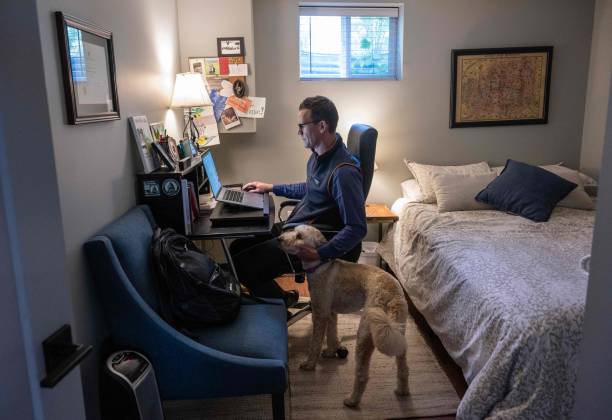
I think i’m being bullied back to work
Being forced to work back in the office is an understandable fear that many employees have. Since the COVID-19 outbreak, many Australian workers have enjoyed newfound freedom to work from home, allowing them to avoid lengthy commutes and save money. But going by the latest statistics, it seems more and more of the nation’s employers are choosing to place limits on work from home policies.
A 2023 survey by recruitment company Robert Half reveals that 87 per cent of Australian companies have implemented mandatory office days for staff. 28 per cent of employers have forced employees back into the office for four days of the week. While 19 per cent have forced their workers back into the office for the full five days.
Facing this push back into the office, the question that many workers may be asking is: Can I be forced to work back in the office? In this article, we detail what your rights are when it comes to working from home and flexible work arrangements. We also outline how new laws now make it possible to take your employer to the Fair Work Commission if they unreasonably refuse a flexible work request.

Can you be dismissed for refusing to work back in the office?
Unfortunately, Australia lags behind other parts of the world when it comes to an employee’s right to work from home. The Netherlands, for instance, has passed legislation that will make working from home a legal right. It requires employers to genuinely consider work from home requests from workers. And if they choose to deny the request, the employer must provide a valid reason why.
Australian workers simply do not have the same protections. Under our workplace laws, employees must adhere to their employer’s reasonable and lawful directions. This means that if you refuse to comply with a direction to work back in the office, your employer may have a valid reason to discipline or dismiss you. This applies to any employee, whether they are employed full-time, part-time, as a casual or on a contract.
Under the Fair Work Act 2009, Australian employees do however have the right to request a flexible work arrangement if they meet certain criteria. And this right has recently been bolstered by new laws.

New laws make it harder to force you back in the office
On 6 June 2023, the nation made a significant stride towards workplace flexibility after changes to legislation surrounding flexible work requests took effect. The changes were part of the Fair Work Legislation Amendment (Secure Jobs, Better Pay) Act 2022, which introduced changes to the Fair Work Act 2009. These changes aim to foster a healthier work-life balance, enhance employee-employer communication and democratise the dispute resolution process.
Prior to these amendments, it was much easier for employers to force employees back in the office. The process of requesting flexible work arrangements was often characterised by opacity and limited negotiation. Employees who sought flexible working hours or conditions often found themselves subject to a one-sided decision-making process by employers. However, the new legislative changes mark a significant shift in this landscape.
The amendments require employers to engage in open discussions with employees before making a decision on a proposed flexible work arrangement request. Rather than being a top-down decision-making process, the legislative amendments encourage both parties to engage in a productive conversation that leads to a mutual agreement.
Employees can challenge mandates forcing them back in the office
The amendments also give employees the power to challenge an employer’s refusal to grant a flexible work arrangement request via the Fair Work Commission. This marks a departure from the previous practice where arbitration over refusals was limited to organisations that had established this provision within an enterprise agreement with their employees. By allowing individual employees the opportunity to contest such refusals, the legislative changes democratise the process and ensure that every employee’s voice is heard.

What is a flexible work arrangement in Australia?
A flexible work arrangement could possibly prevent your employer from forcing you to work back in the office. However, such an arrangement does necessarily mean that you are entitled to work from home. Your employer has the ultimate say on whether you are allowed to do so.
The range of flexible work arrangements available under Australian law is broad and includes adjustments to work hours, patterns and locations. Examples of flexible working arrangements include:
- Starting work at a later time and finishing at a later time.
- Working more hours on certain days, and less on others.
- “Purchasing” additional paid leave or taking unpaid leave.
- Working in part time or casual capacity.
- Flexible rostering.
- “Banking” extra hours worked, which can be exchanged for time off.
- Taking rostered days off as two half days.
- Job sharing.
- Working from home or another location.

Who can request a flexible work arrangement?
So, a flexible work arrangement could prevent your employer from forcing you to work back in the office. But it is important to remember that the ability to work from home is just one of many possible scenarios that you can negotiate with your employer. It is also important to understand that the right to request a flexible work arrangement is not automatically guaranteed to all employees. The Fair Work Act 2009 states you can make a flexible work arrangement request if:
- You are a permanent employee who has worked for their employer for at least 12 months.
- You are a casual employee who has worked for their employer for at least 12 months. And you have a reasonable expectation that your employment will continue on a regular and systematic basis.
If you meet one of the above, you can make a flexible work request if you are also:
- A parent or carer of a child that is of school-age or younger;
- A carer (as the term is defined in the Carer Recognition Act 2010. That is, someone who provides personal care, support and assistance to an individual in need due to disability, medical condition, frailty or age);
- Have a disability;
- 55 years old or older;
- Experiencing family violence;
- Providing care or support to a family member or someone you live with who is experiencing family violence.
Many employees become distracted

How employers must respond to a flexible work arrangement request
Under the Fair Work Act 2009, you do not have the legal right to work from home. Rather, you have the right to request to work from home. This means that your employer can deny your request and legally force you to work back in the office. Upon submitting a written request for a flexible work arrangement, your employer is legally required to consider your request. They must also discuss it with you and genuinely attempt to come to an agreement with you. Your employer must deliver a written response to you within 21 days, either granting or refusing the request.
Refusals must be based on “reasonable business grounds.” This can encompass a range of reasons why your flexible work arrangement is not seen as feasible. For instance, it could be that:
- The arrangement would impose a prohibitive cost on your employer.
- Your employer does not have the capacity to change the working arrangements of other employees in order to accommodate your arrangement.
- It is not practical for your employer to change the working arrangements of other employees or take on new employees in order to make your arrangement feasible.
- It is probable that your arrangement could lead to a sizeable drop in efficiency and or productivity. Or it may have a detrimental effect on customer service.
This is not an exhaustive list of all the reasons why your employer can deny your flexible work arrangement request. There could be other legitimate reasons, all of which they need to specify in their written response to you.
Make sure your FWA request is in writing
When providing a written response refusing your request, your employer must outline the reasons for the refusal. They must also state if they are willing to make other changes to provide flexible working, or if there are simply no changes that they can make. Your employer must also provide details of how you can resolve flexible work arrangement disputes via the Fair Work Commission.

Challenging a flexible work refusal via the Fair Work Commission
If your flexible work arrangement is refused by your employer, it is likely that they will be able to force you to work back in the office. However, if you believe the refusal was unreasonable, you can take action via the Fair Work Commission. You can also take action if your employer fails to respond to your request within 21 days.
The Fair Work Commission will aim to foster a resolution between you and your employer via a conciliation or mediation session. If that fails, your dispute may proceed to a formal hearing where both parties can provide evidence.
Flexible work dispute example: Fair Work Commission sides with employee
The case of Natasha Fyfe v Ambulance Victoria [2023] provides an insight into how the Fair Work Commission will handle flexible work disputes following the amendments to the Fair Work Act 2009. The case involved a paramedic, Natasha Fyfe, who requested a flexible work arrangement for her night shift duties. While her proposed arrangement deviated from the traditional schedule, it aimed to enable her to care for her children while her partner was at work.
Ms Fyfe requested that she start her night shift at 9PM rather than 6PM, and finish at 6AM rather than 8AM. Ambulance Victoria rejected her request, leading to a dispute that escalated to a hearing with the Fair Work Commission. At the hearing, the Fair Work Commission ruled that Ambulance Victoria lacked reasonable business grounds for refusing Ms Fyfe’s flexible work arrangement request. It was found that Ambulance Victoria had failed to engage in discussions with Ms Fyfe and had not made genuine attempts to reach an agreement with her.
Employer appeals Fair Work Commission decision
On appeal, the Full Bench of the Fair Work Commission acknowledged that Ambulance Victoria did have some business grounds to refuse the flexible work arrangement. However, the Full Bench noted that these were not enough to justify a refusal based on “reasonable business grounds.”
Importantly, the case underscores the importance of timely, clear and evidence-based communication in the context of flexible work arrangement requests. It emphasised that employers should provide detailed reasons for their refusals, supported by the available evidence at the time of the decision.

Have you been unfairly dismissed?
Have you encountered unfavourable treatment in your workplace? If you have faced unfair dismissal, been subject to discrimination, or treated inequitably due to exercising your workplace rights, reach out to us at A Whole New Approach.
Our expert team of workplace mediators can help you take action through the Fair Work Commission. Over the last three decades, we have helped over 16,000 Australian workers fight for their rights. We understand how the FWC works, so we can help you get the best possible outcome. We work on a national basis, including, Victoria, NSW, QLD
When you choose us, you benefit from our no win, no fee service. And your first consultation with us is completely free and confidential. So if you have been unfairly dismissed or have experienced adverse action, or forced to resign after being forced into working arrangment that are not fair, do not wait, call now.
Contact A Whole New Approach on 1800 333 666 today and let us help you get the justice you deserve.
Articles similar to: WFH Can I be forced to work back in the office?
Browse similar articles to related to being forced back into the workplace. We cover abandonment of employment, being honest with your employer, and understanding how much your unfair dimissal case is worth if you were successful.
The right to disconnect from work






